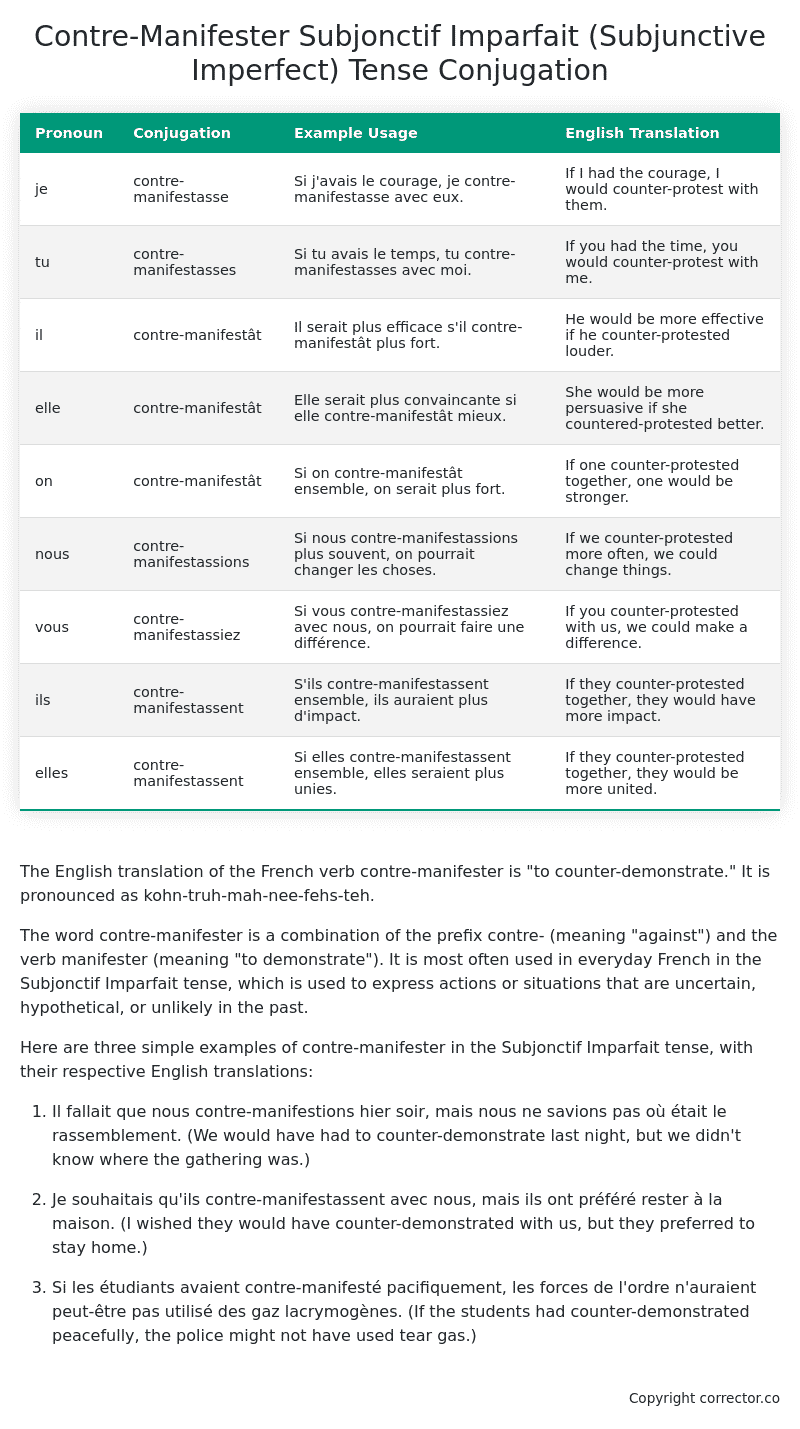Subjonctif Imparfait (Subjunctive Imperfect) Tense Conjugation of the French Verb contre-manifester
Introduction to the verb contre-manifester
The English translation of the French verb contre-manifester is “to counter-demonstrate.” It is pronounced as kohn-truh-mah-nee-fehs-teh.
The word contre-manifester is a combination of the prefix contre- (meaning “against”) and the verb manifester (meaning “to demonstrate”). It is most often used in everyday French in the Subjonctif Imparfait tense, which is used to express actions or situations that are uncertain, hypothetical, or unlikely in the past.
Here are three simple examples of contre-manifester in the Subjonctif Imparfait tense, with their respective English translations:
-
Il fallait que nous contre-manifestions hier soir, mais nous ne savions pas où était le rassemblement. (We would have had to counter-demonstrate last night, but we didn’t know where the gathering was.)
-
Je souhaitais qu’ils contre-manifestassent avec nous, mais ils ont préféré rester à la maison. (I wished they would have counter-demonstrated with us, but they preferred to stay home.)
-
Si les étudiants avaient contre-manifesté pacifiquement, les forces de l’ordre n’auraient peut-être pas utilisé des gaz lacrymogènes. (If the students had counter-demonstrated peacefully, the police might not have used tear gas.)
Table of the Subjonctif Imparfait (Subjunctive Imperfect) Tense Conjugation of contre-manifester
| Pronoun | Conjugation | Example Usage | English Translation |
|---|---|---|---|
| je | contre-manifestasse | Si j’avais le courage, je contre-manifestasse avec eux. | If I had the courage, I would counter-protest with them. |
| tu | contre-manifestasses | Si tu avais le temps, tu contre-manifestasses avec moi. | If you had the time, you would counter-protest with me. |
| il | contre-manifestât | Il serait plus efficace s’il contre-manifestât plus fort. | He would be more effective if he counter-protested louder. |
| elle | contre-manifestât | Elle serait plus convaincante si elle contre-manifestât mieux. | She would be more persuasive if she countered-protested better. |
| on | contre-manifestât | Si on contre-manifestât ensemble, on serait plus fort. | If one counter-protested together, one would be stronger. |
| nous | contre-manifestassions | Si nous contre-manifestassions plus souvent, on pourrait changer les choses. | If we counter-protested more often, we could change things. |
| vous | contre-manifestassiez | Si vous contre-manifestassiez avec nous, on pourrait faire une différence. | If you counter-protested with us, we could make a difference. |
| ils | contre-manifestassent | S’ils contre-manifestassent ensemble, ils auraient plus d’impact. | If they counter-protested together, they would have more impact. |
| elles | contre-manifestassent | Si elles contre-manifestassent ensemble, elles seraient plus unies. | If they counter-protested together, they would be more united. |
Other Conjugations for Contre-Manifester.
Le Present (Present Tense) Conjugation of the French Verb contre-manifester
Imparfait (Imperfect) Tense Conjugation of the French Verb contre-manifester
Passé Simple (Simple Past) Tense Conjugation of the French Verb contre-manifester
Passé Composé (Present Perfect) Tense Conjugation of the French Verb contre-manifester
Futur Simple (Simple Future) Tense Conjugation of the French Verb contre-manifester
Futur Proche (Near Future) Tense Conjugation of the French Verb contre-manifester
Plus-que-parfait (Pluperfect) Tense Conjugation of the French Verb contre-manifester
Passé Antérieur (Past Anterior) Tense Conjugation of the French Verb contre-manifester
Futur Antérieur (Future Anterior) Tense Conjugation of the French Verb contre-manifester
Subjonctif Présent (Subjunctive Present) Tense Conjugation of the French Verb contre-manifester
Subjonctif Passé (Subjunctive Past) Tense Conjugation of the French Verb contre-manifester
Subjonctif Imparfait (Subjunctive Imperfect) Tense Conjugation of the French Verb contre-manifester (this article)
Conditionnel Présent (Conditional Present) Tense Conjugation of the French Verb contre-manifester
Conditionnel Passé (Conditional Past) Tense Conjugation of the French Verb contre-manifester
L’impératif Présent (Imperative Present) Tense Conjugation of the French Verb contre-manifester
L’infinitif Présent (Infinitive Present) Tense Conjugation of the French Verb contre-manifester
Struggling with French verbs or the language in general? Why not use our free French Grammar Checker – no registration required!
Get a FREE Download Study Sheet of this Conjugation 🔥
Simply right click the image below, click “save image” and get your free reference for the contre-manifester Subjonctif Imparfait tense conjugation!

Contre-Manifester – About the French Subjonctif Imparfait (Subjunctive Imperfect) Tense
Formation
Common Everyday Usage Patterns
Interactions with Other Tenses
Subjonctif Présent
Indicatif Passé Composé
Conditional
Conditional Perfect
Summary
I hope you enjoyed this article on the verb contre-manifester. Still in a learning mood? Check out another TOTALLY random French verb conjugation!


